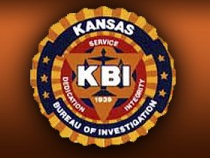The efforts of the Kansas Sexual Assault Kit Initiative are supported by a federal grant awarded to the KBI by the U.S. Department of Justice’s Bureau of Justice Assistance (BJA) in 2016
April 11, 2018
The Kansas Bureau of Investigation (KBI) announced today that the Kansas Sexual Assault Kit Initiative has formally recommended all sexual assault kits collected in Kansas be submitted to a forensic laboratory for analysis.
The recommendation comes after more than two years of study by the Kansas Sexual Assault Kit Initiative’s statewide multidisciplinary working group, which was tasked with evaluating the financial, legal, and systematic barriers to sexual assault kit testing. The group – which includes members of law enforcement, prosecutors, laboratory professionals, medical professionals, and victim advocates from across the state – first assisted in making recommendations to prioritize the testing of over 2,200 previously unsubmitted sexual assault kits (SAKs) in Kansas.
The group then focused on trying to develop a method by which incoming cases could be prioritized for testing. After extensive research and exploring a variety of options, the group recommended a strong focus be placed on case-specific communication between law enforcement, prosecutors, and the laboratory. Notably, the group cautioned against deprioritizing testing for reasons including the victim’s use of alcohol or uncertainty of events, or a suspect’s claims of consent.
“The value of testing SAK evidence and uploading qualifying profiles into the CODIS databank should not be underestimated,” said KBI Director Kirk Thompson in a letter to all Kansas law enforcement agencies, prosecutors, and forensic laboratories. “While DNA evidence may not always contribute to resolving the immediate case, testing all SAKs ensures we are better able to link cases together and hold offenders accountable for their actions.”
While the “submit all/test all” recommendation was fully endorsed by all members of the working group, the group recognizes that laboratory resources and capacity remain limited.
“Ensuring every kit collected gets tested by a forensic laboratory not only sends an important message to victims of sexual assault, it improves our ability to identify perpetrators of sexual violence and prevent additional victimization,” said KBI Executive Officer Katie Whisman, who leads the statewide initiative. “But, testing can’t be done in a timely manner if state and county laboratories lack the necessary capacity. We have come a long way, but we still have work to do.”
The efforts of the Kansas Sexual Assault Kit Initiative are supported by a federal grant awarded to the KBI by the U.S. Department of Justice’s Bureau of Justice Assistance (BJA) in 2016. The grant is helping the KBI and their partners reduce the number of unsubmitted sexual assault kits across the state, arrest and prosecute violent offenders, and support victims.
The ultimate goal of the initiative is to prevent victimization by identifying more perpetrators of sexual assault, including serial offenders, while gaining justice for more victims and increasing public safety.


